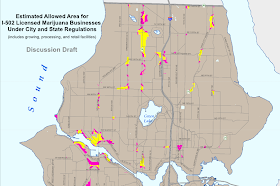Washington State voters allowed marijuana (MMJ) consumption and use for medical reasons in 1998 via initiative 692; but the portions dealing with retailing and production were inexplicably vetoed by then-governor Christine Gregoire.
There are no state laws or rules regarding the retailing of marijuana under the current MMJ law, nor are there restrictions on where dispensaries (places were marijuana is retailed) can be located.
 |
| Yellow areas are where retail marijuana can be located in this portion of Seattle Here's a link to a bigger map |
So there's a pretty big fight going on right now between current MMJ retailers and the state government-backed I502 retailers. Initiative 502 describes a set of setbacks from schools, parks, arcades and other locations where children are present, which are basically the same as the federal restrictions. The net result of this is that most areas of most cities in Washington state will not meet I502s criteria, and there's been complaints that the total number of retail outlets is absurdly small. The city of Seattle alone has over 300 MMJ dispensaries at this time, but is only allocated 21 retail licenses under I502. With very limited placement and few licenses I502 retailers face a substantial competitive threat while MMJ dispensaries are operating as they have been. The Seattle City Attorney Pete Holmes has actually urged the WSLCB to allow more retail licenses.
The other big issues is that I502 describes a 50 to 75% tax rate on marijuana, where MMJ sales are untaxed.
The WSLCB isn't blind to these issues, and neither is the legislature; it's likely that the proposed regulations that are submitted to the legislature on January 1 will contain substantial changes to the existing MMJ regulations that level the playing field between MMJ and I502. Look for a lot of arm wrestling between the MMJ community and the WSLCB and the Washington State Legislature for the next couple of months.
While the MMJ and I502 fight goes on at the State level, on a city and county and tribe level there's a whole different fight going on. Many cities and several counties have either put a moratorium on I502 locations or businesses, or have modified their zoning to control the placement of I502 (and in some cases, MMJ) businesses, either retail or production/processing. At least two native american tribes have also prohibited the production or sale in their tribal reservations. In my case, the regulations that Snohomish County has put into place seem pretty reasonable and rational. Anyplace you can put a liquor store you can put a marijuana store. Agricultural zones can be used for production or processing of Marijuana, and while some cities in this county have issued moratoriums, the county as a whole is pretty much open for business.
None of this complicated zoning/regulation issue has deterred people from applying for licenses. The WSLCB recieved over 900 applications in the first 48 hours of the licensing period, and they are receiving between 200 and 300 more each day. I expect the number of license applications to increase as we get nearer to the deadline. I predicted that we would have 10,000 applicants last year, and at 300 a day now, we are on track for that.
It's been interesting to watch this play out. My guess is that the retail stores will open to supply problems; and that most of the people who are applying for licenses now don't really have an accurate picture of what the economics will be like over time. I expect the wholesale price of a pound of pot to be something like $800 to $900, net of taxes, pretty close to the cost of production.
Welcome to farming, folks. Just jump right on in. The waters fine!

I saw a news story you were recently featured in. Have you decided to go forward with starting a grow operation? It sounds like from your post you think it's going to be hard to make money (you said wholesale price is going to be equal to cost of production).
ReplyDelete